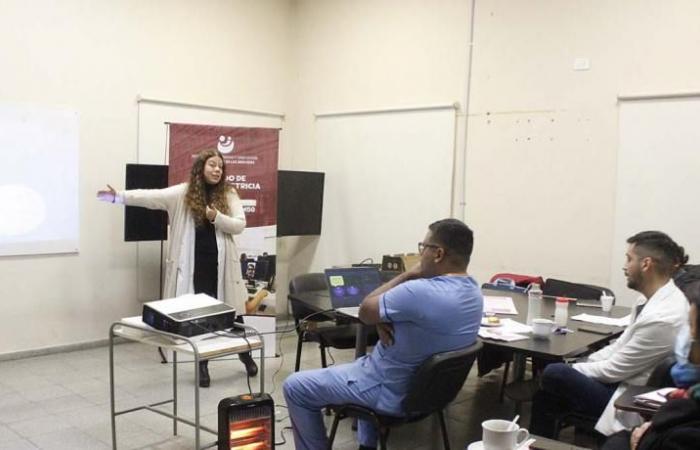This Wednesday, a training course was held for midwifery graduates who will work in the new node of the Avellaneda hospital. The course is part of a project to expand the midwifery nodes to all maternity wards in the province.
About this, the head of the Immunization Department, doctor Miguel Ferre Contreras, commented: “It is aimed at the personnel who are going to integrate the new Teleobstetrics node. From my area we emphasize the importance of the vaccines that pregnant women should receive, since during this period it is the opportunity to complete the vaccination schedules and the national vaccination calendar that contains a series of vaccines aimed at protecting both the pregnant woman, like your newborn.”
Likewise, the representative highlighted that the current campaign on the flu vaccine is essential since all pregnant women must receive it at any time during pregnancy, just like the Covid vaccine.
“This year in particular, a new vaccine has been incorporated into the National Vaccination Calendar against the respiratory syncytial virus, which protects newborns up to six months of age against bronchiolitis, a respiratory disease that can be very severe. Women are vaccinated between 32 and 36 weeks of pregnancy, in this way they develop antibodies and transmit them to their baby,” she explained.
Likewise, the Triple Bacterial Cellular vaccine is given from 20 weeks of pregnancy and its objective is to protect the newborn against a very severe disease, which is whooping cough. We see this pathology less and less in our country thanks to vaccination.
“This was a very interesting day where we have been able to clarify the doubts of obstetrics graduates, with the aim that they can protect pregnant women in all aspects that may threaten the health of their pregnancy or the newborn,” he highlighted.
Finally, Ferre Contreras emphasized the importance of opening this node in the Avellaneda hospital since it is the kickstart for it to be replicated in all maternity hospitals in the province. “This is an ambitious project by the minister, Dr. Luis Medina Ruiz, who began with teleobstetrics only as a telephone service and later expanded to 24-hour care, now it is being extended to two satellite nodes in each of the “Hospitals that have maternity hospitals, articulating not only telemedicine, but also in-person patient care.”
For his part, the graduate in obstetrics, Juan Aguero, coordinator of the first node of the Institute of Maternity and Gynecology, expressed: “Yesterday began the day for new professionals who join the teleobstetrics program. Yesterday we explained the way in which this first node is being worked on. In addition to the action guidelines that we have to monitor pregnant women in order to contribute to good control and in this way reduce maternal and child morbidity and mortality.”
“The important thing about this is to detect the risk factors to carry out timely follow-up and have a corresponding articulation with the first, second and third level, depending on what risk factor the patient has. What we want is for the pregnant woman to be controlled, monitored and have all the necessary interventions from the health system,” she concluded.






